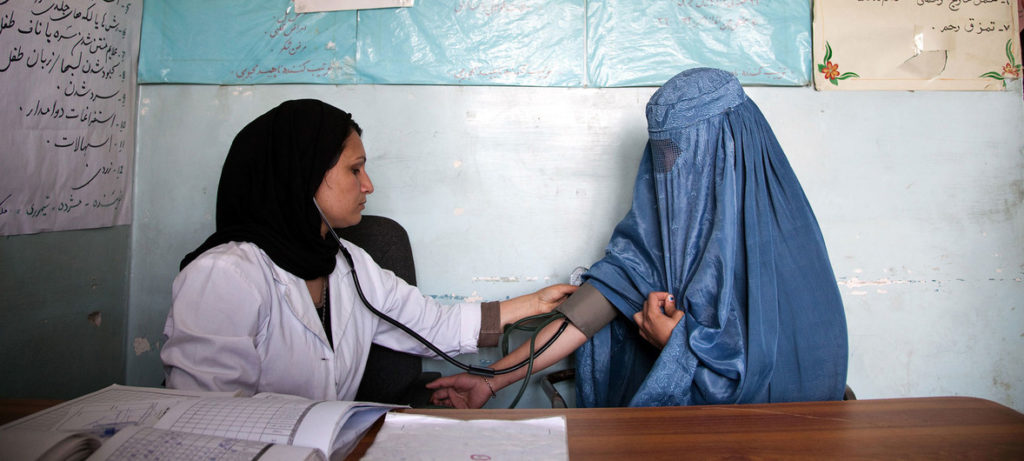Deliberate attacks on healthcare in Afghanistan during Covid-19 pandemic: UN Special Report
Most of these healthcare-related incidents were attributed to the Taliban

Kabul – The United Nations in Afghanistan is gravely concerned by recent deliberate attacks on healthcare personnel and facilities, especially in the context of the COVID-19 pandemic.
A new special report released today by the UN Assistance Mission in Afghanistan (UNAMA) presents the findings of its monitoring of all incidents of the armed conflict affecting healthcare from 11 March, the date on which the World Health Organization declared the outbreak of COVID-19 a global pandemic, to 23 May, the start of a three-day ceasefire between the Taliban and the Government of Afghanistan.
Continuing attacks on healthcare
The report, ‘Attacks on Healthcare during the COVID-19 pandemic,’ documents the harm to healthcare workers, damage to healthcare facilities and other ways in which parties to the conflict have interfered with necessary healthcare, both as a result of targeted attacks as well as from ongoing fighting.
UNAMA earlier raised concerns about such incidents in its protection of civilians report for the first quarter of 2020. Since then, the situation deteriorated: the Taliban continued abducting healthcare workers and attacked a pharmacy; the Afghan national security forces carried out deliberate acts of violence and intimidation affecting a healthcare facility, workers and the delivery of medical supplies; and unknown gunmen perpetrated an attack on a maternity ward in a hospital in Kabul, resulting in dozens of civilian casualties.
“At a time when an urgent humanitarian response was required to protect every life in Afghanistan, both the Taliban and Afghan national security forces carried out deliberate acts of violence that undermined healthcare operations,” said Deborah Lyons, the Secretary-General’s Special Representative for Afghanistan and head of UNAMA. “There is no excuse for such actions; the safety and well-being of the civilian population must be a priority.”
The report documents 15 incidents affecting healthcare provision, where 12 were deliberate attacks and the remaining incidents involved incidental harm. Most of these healthcare-related incidents – eight of the targeted attacks and two of the incidents with incidental harm – were attributed to the Taliban.
The Afghan national security forces were responsible for three targeted attacks against healthcare. One instance of incidental harm to healthcare occurred in the context of clashes between Afghan national security forces and the Taliban. The most abhorrent attack, on a maternity ward in a Kabul hospital, remains unattributed.
Attacks constitute war crimes
The UN Report report emphasizes that deliberate acts of violence against healthcare facilities, including hospitals and related personnel, are prohibited under international humanitarian law and constitute war crimes.
“Perpetrating targeted attacks on healthcare during the COVID-19 pandemic, a time when health resources are already stretched and of critical importance to the civilian population, is particularly reprehensible,” said Fiona Frazer, UNAMA Chief of Human Rights.
The report underscores that the harm caused by attacks on healthcare, particularly during a health pandemic, extends well beyond the direct victims of those incidents. It stresses that even with an ongoing conflict, the people of Afghanistan have the right to the highest attainable standard of physical and mental health under international human rights law. The enjoyment of such a right is severely compromised by the incidents described in this report.
The United Nations condemns all deliberate attacks, threats, abductions and other intentional acts against healthcare facilities and personnel, as outlined in the report. In a situation in which the entire population in Afghanistan is at risk from COVID-19, there can be no greater priority than ensuring that health services can continue to operate without interference, interruption, and with sufficient resources.
The report sets out that parties are obliged under international humanitarian law to protect healthcare facilities and personnel from harm and urges them to immediately cease such deliberate attacks.
This is crucial at any time, but even more so when all efforts should be focused on increasing capacity, efficiency and support of the healthcare system in Afghanistan, particularly when demands are increasing. Moreover, the UN in Afghanistan urges the parties to heed the Secretary-General’s call for a global ceasefire so all attention and resources can be directed toward fighting the COVID-19 pandemic and prevent further harm being caused to the people of Afghanistan.
The special report, ‘Attacks on Healthcare during the COVID-19 pandemic,’ can be read here:
unama.unmissions.org/protection-of-civilians-reports